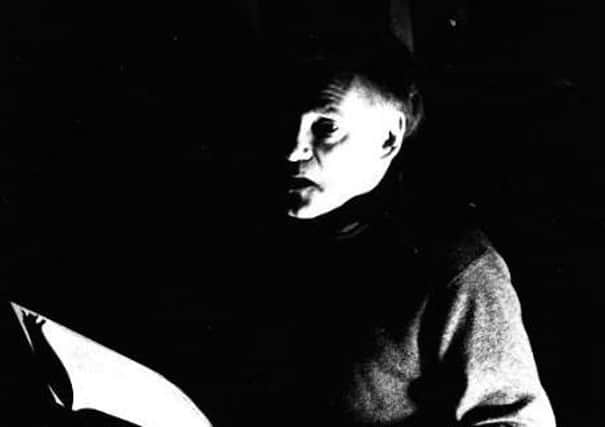Obituary: John McColl, talented teacher and sought-after amateur actor


John McColl was an exceptional teacher of the subject of English, instilling in his pupils the essentials of the language as well as a love and deep knowledge of classical and 20th century literature. He was also one of Scotland’s foremost amateur actors renowned for his professionalism and the way he could use the spoken word to bring out the best in scripts.
His parents sent him to be educated at George Heriot’s Junior School in 1935. By the time he was old enough to enter the senior school at the age of 11 his father had died. This meant he qualified for a Foundationer’s place funded by the school’s charitable trust. School records reveal that his love for acting shone through at an early age, describing him as a “fine actor in the drama society”.
Advertisement
Hide AdAdvertisement
Hide AdBoth his dependable character and intellectual ability were also deemed worthy of note. A “good product of the school,” stated the record.
In 1947, John gained entrance into the University of Edinburgh, graduating with an Honours MA degree in English Language and Literature in 1951. Thereafter he successfully undertook teacher training at Moray House College of Education.
He completed his National Service between 1953 and 1955 with the RAF in Gloucestershire. By 1956 he was able to start his teaching career at Darroch Secondary School in Edinburgh. In 1960 he moved to Leith Academy, where he gained promotion to assistant principal teacher level. In 1974 he took up a post as teacher of English at George Watson’s College – an appointment he held until his retirement at the age of 65 in July 1994.
At Watson’s he brought to life the best in classical and 20th century literature with Shakespeare and Dickens being amongst his specialities.
During an HMI Inspection he was observed teaching, after which the now late Harry Quinn was told in no uncertain terms that John was the best teacher he had.
It was the former head teacher, the late Sir Roger Young, who introduced a strand of learning called Who Am I? into the sixth form curriculum. These were periods in which a wide range of topics in the arts, philosophy, psychology and ethics were discussed – all unhampered by the constraints of exam syllabi.
John took the opportunity for deep and personal explorations of literature with his pupils, stimulating discussion on plays being staged in Edinburgh Royal Lyceum Theatre.
John was much sought after in amateur dramatic circles for his prowess in acting. Initially he appeared in productions by the Jason Players. When it folded he was immediately snapped up by Leitheatre to play the lead role of Sir Thomas More in the Robert Bolt play A Man for All Seasons. His other lead roles included the judge in the Agatha Christie play Witness for the Prosecution, as well as the judge in To Kill A Mocking Bird and the American lawyer Alfieri in Arthur Miller’s View From The Bridge. He also played many Shakespearean roles including Macbeth.
Advertisement
Hide AdAdvertisement
Hide AdJohn was versatile in both genres and accents. Over 15 years he had a role in the comedy dramas Leitheatre staged annually in the Edinburgh International Fringe Festival. He played, for example, the monk Brother Barnabus in James Scotland’s hilariously irreverent Cambusdonald Royal.
He was a lover of all the arts and a regular goer to musical concerts, plays and dance. In 1983 he happily gave of his services to the semi-professional dance company Khoros Dance Theatre, appearing on the Netherbow Theatre stage as “the poet” reading extracts from TS Elliot’s Four Quartets, delivering the nuances of the words in fusion with the movement of the dancers.
In all, he performed in more than 250 plays, only giving up in his late 80s when failing hearing presented him with difficulties in picking up on cues from fellow performers.
He never expressed a longing to be a professional actor and considered that amateur dramatics gave him access to a wider range of leading roles, For example, he was the Inspector in JB Priestley’s An Inspector Calls, delivering a standard which more than matched the performances of the professionals. He would arrive at rehearsals with his lines already learned off by heart and he would go on to annotate his text with detailed directions. He was considered by fellow amateurs to be a joy to work with.
From 2014 until July 2019 John also travelled regularly to the Royal Institute of the Blind’s transcription studio in Partick to translate books and other texts into audio versions.
He was a long standing member of Church of Scotland’s Inverleith St Serf’s, holding the positions of elder and church visitor as well as being part of the welcome team. His empathy and warm personality underpinned his ability to identify with all age groups, as did his sound knowledge of the fabric and history of the church, which he shared with many during the city’s annual Doors Open Day.
John met his wife Marjory (sister of the now deceased British character actor Roy Kinnear)through the amateur dramatics scene and a play John was directing.
Their portrayal of a married couple in Alan Bennett’s Changing Places attracted special commendation for the authenticity of their performance in the Scottish Community Drama Association’s One Act Play Festival. They were married for 63 years.
Advertisement
Hide AdAdvertisement
Hide AdJohn is survived by wife Marjory, daughter Fiona and son John, and by daughter-in-law Helen and son-in-law Alan; grandchildren Caroline, David, Rory, Katy, Alexa and Joanna and four great grandchildren.
KAY SMITH
Comments
Want to join the conversation? Please or to comment on this article.